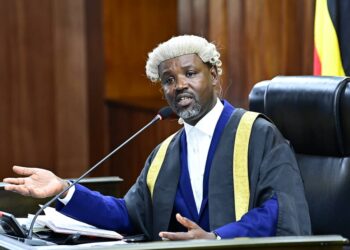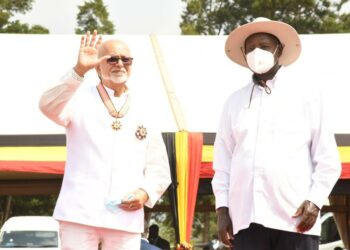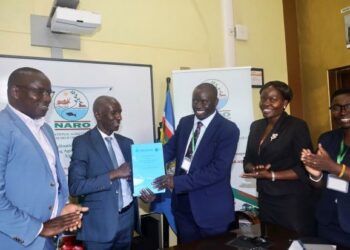KYAKA II, Kyegegwa District – A new vocation training centre (VTC) was officially inaugurated on Thursday in Kyaka II refugee settlement, in the presence of Jonathan Ball, Australian Deputy High Commissioner to Uganda and Joel Boutroue, the UN Refugee Agency (UNHCR) Representative to Uganda.
The plan is train more than 2,000 refugee and Ugandan youth on income generation skills over the course of next three years, in line with UNHCR’s commitment to support the social and economic inclusion of refugees through education, vocational training, livelihoods promotion and self-reliance initiatives.
“Economic empowerment through skills training contributes to the self-reliance and resilience of refugees,” said Boutroue. ”Investing in skills development programmes for refugees and their local hosts helps reduce aid-dependency and negative coping mechanisms and it contributes to the local economy.”
Australia for UNHCR, one of the several national associations raising funds for UNHCR globally, supported the VTC by investing approximately USD 661,000 in the construction of the centre and implementation of vocational training programmes. In order to ensure the sustainability of this project and integration with government service delivery, the VTC will be handed-over to district authorities in five years.
Vocational courses include cookery, hairdressing and barbering, agriculture, and motorcycle and bicycle repair. Fin Church Aid, one of UNHCR’s partners in Uganda, will run the implementation of these programmes in Kyaka II, which is home to more than 106,000 refugees.

Speaking at the ceremony, Ball lauded Uganda’s progressive refugee policies and emphasised the need for collective responsibility-sharing. “It makes more sense to help refugees become self-reliant right from the start. I have no doubt that investments in education, skills training and livelihoods opportunities can contribute to improving the lives of refugees and the communities who welcome them.”
Operational since May this year, the VTC currently provides training to some 250 students and can host 100 additional trainees. Thirty percent of the present students are local Ugandans. After successfully completing their trainings, the graduates will receive a start-up kit to help them set up their business.
The programmes are designed for young women and men between the ages of 15-25. Acknowledging that not all youngsters have had the opportunity to complete their education, the VTC will offer both formal and non-formal courses. Students who have already completed their primary or secondary education will be enrolled in formal training, accredited by the Ministry of Education and upgradable to diploma and degree level. Non-formal courses offer mostly hands-on skills and can be undertaken without any prior educational requirement.
Uganda hosts more than 1.33 million refugees and continues to receive new arrivals fleeing insecurity and human rights violations in neighbouring countries. Since January 2019, more than 72,000 people have crossed to Uganda from the Democratic Republic of the Congo, South Sudan and Burundi.
Do you have a story in your community or an opinion to share with us: Email us at editorial@watchdoguganda.com











